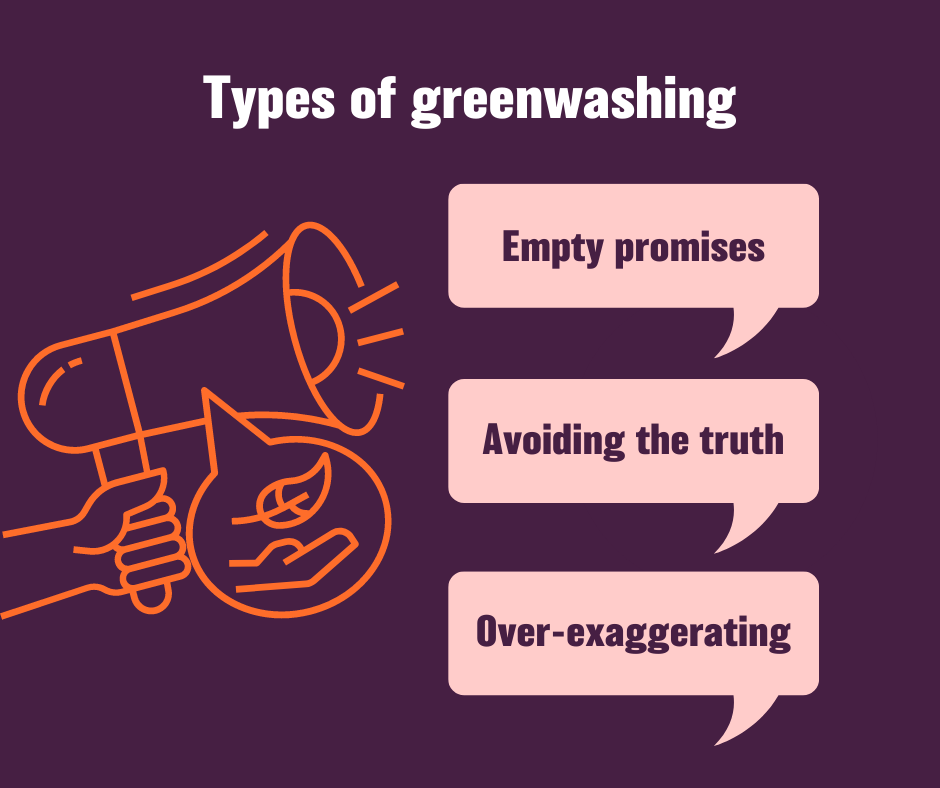In this lesson you will learn 💸
- What greenwashing is
- How you can hold companies responsible for greenwashing
- How you can identify greenwashing in your investments (and your daily life)
What is greenwashing?
Greenwashing is when a company presents itself as more ethical than it actually is.
For example, a brand might advertise that they’ve donated a huge amount of money towards environmental charities, but you might find out that costs associated to their level of pollution is five times the donation. By disguising their unethical or unsustainable activity, many responsible investors end up putting their money into something that unknowingly doesn’t support their values.
What can greenwashing look like?
Here are some examples:

Empty promises
In this scenario, companies might ‘promise’ to do better, or make huge claims that they’re going to achieve ‘X’ or ‘Y’ by 2025, without actually sharing the details of how they’re planning to do that. Real sustainable change comes connected to a lot of projects and in different steps - if a company can’t show you what those steps look like, you might need to question whether they actually plan to do them at all.
Avoiding the truth
In the example above, where a company might donate to charity while still racking up huge amounts of pollution or environmental damage, they’re avoiding the truth. Social media is a great tool to help figure out whether a company is hiding anything, so a quick tip for researching sustainable investments is to search their name on your socials. If they’re reputation has taken a hit recently, it will probably be one of the first things to show up.
Over-exaggerating
We’re all guilty of stretching the truth slightly on occasion, but hopefully, when you and I tell a white lie, it isn’t causing mass damage to the planet. This form of greenwashing comes up when companies use sustainable terminology for products that don’t actually meet the criteria, such as claiming something to be ‘vegan’ because it doesn’t use any animal products, but throughout the production chain, it still involves animal testing.
Why is greenwashing a problem?
The main reason why greenwashing exists in sustainable finance is because sustainability is a new topic which doesn’t yet have all the terminology and frameworks set in stone. Where one company claims they’re ‘responsible’, another might use the word ‘ethical’ or ‘sustainable’ - while all the definitions and differences with this terminology are still being figured out, it’s easy for companies to jump on the ‘sustainability bandwagon’ and win new customers.
How can you avoid greenwashing?
Here are three ways that might help:
Do your research
When you’re deciding which companies or industries you want to invest your money in, you should make sure to spend time looking into their reputation, promises they’ve made in the past (and whether they were able to deliver), and how their values are reflected along every step of the company journey.
Avoid 'big statements'
The point of marketing and advertising is to get you, the consumer, to purchase a specific item or product. A lot of the time, it’s a necessary part of our economy - companies market their products so that new people can learn about the benefits and hopefully improve their lives. But if a company is promoting sustainability and throwing about huge statements such as ‘we’re saving the planet’ or ‘this product stops climate change’ - you might be let down when you see their actual impact.
Hold your investments accountable
If you’ve done your research and you’re happy with where your money is going, make sure that you don’t stop there. If a company gives a target deadline, make sure you follow up at that point - did they manage to deliver? A good way to hold companies accountable is to talk about your values and to share with others when you discover a potential case of greenwashing. The more people who talk about an issue, the more likely a company is to join the conversation and start with actual change.
How can you avoid greenwashing in your everyday life?
Here are a couple places to help you start:
- Look at the packaging your products arrive in - if it’s single-use plastic, can you write an email or challenge the company about why they haven’t made this recyclable yet?
- Watch the adverts between your favourite shows and see if you can identify any of the greenwashing examples we listed in this lesson - the more you come to understand about the topic, the easier it is to avoid it.
- Double check your ‘small business’ purchases - you might believe that by supporting a smaller company, your money is being used more ethically. A quick search online can tell you whether the company is actually owned by a larger ‘parent company’ that is just looking to make a profit off of green labels.